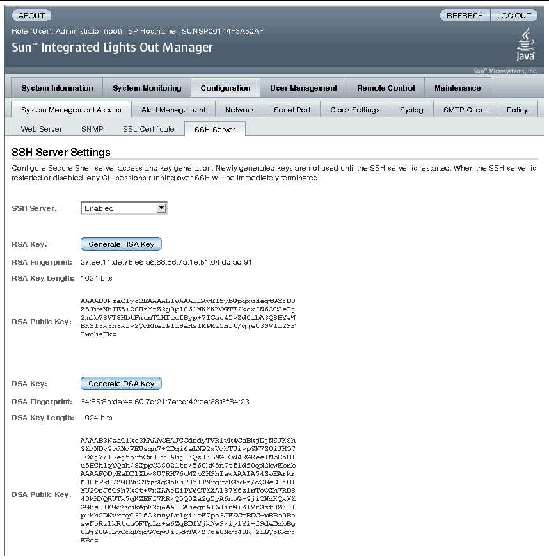Oracle Ilom Ssh Generate Keys
Required Keys and OCIDs. Whether you're using an Oracle client (see Software Development Kits and Command Line Interface) or a client you built yourself, you need to do the following:. Create a user in IAM for the person or system who will be calling the API, and put that user in at least one IAM group with any desired permissions. See Adding Users.You can skip this if the user exists already. Instances launched using Oracle Linux, CentOS, or Ubuntu images use an SSH key pair instead of a password to authenticate a remote user (see Security Credentials). A key pair consists of a private key and public key. You keep the private key on your computer and provide the public key every time you launch an instance.
Obtain a Custom SSL Certificate and Private Key Using OpenSSLToolkit
Oracle Ilom Snapshot
This procedure is a simplified description on how to obtain a custom SSL Certificate using the OpenSSL toolkit. Your requirement to use a temporary self-signed or a certificate authority-signed certificate should be determined by your site administrator or security officer. In the event you do need to obtain a custom SSL certificate (temporary self-signed or certificate authority-signed), you can follow these example OpenSSL command-line instructions below.

Oracle Ilom Ssh Generate Keys Download

Oracle Ilom Ssh Generate Keys Free
- Createa network share or local directory to store the certificate andprivate key.
- To generate a new RSA privatekey using the OpenSSL toolkit, type:
openssl genrsa -out <foo>.key 2048
Where <foo> equals the nameof the private key.
Note - This private key is a 2048 bit RSA key which is storedin a PEM format so that it is readable as ASCII text. - To generate a certificate signingrequest (CSR) using the OpenSSL toolkit, type:
openssl req -new -key <foo>.key -out <foo>.csr
Where <foo> equals the nameof the certificate signing request.
Note - During the generation of the CSR, you will be promptedfor several pieces of information.A <foo>.csr fileshould now appear in your current working directory.
- To generate an SSL certificate,perform one of the following:
- Generate a temporary self-signed certificate(good for 365 days).
The self-signed SSL certificate is generated from the server.key privatekey and server.csr files.
Using the OpenSSL toolkit, type:
openssl x509 -req -days 365 -in <foo>.csr
-signkey <foo>.key -out <foo>.cert
Where <foo> equals the nameassigned to the private key (.key) or certificate (.cert).
Note - This temporary certificate will generate an error inthe client browser to the effect that the signing certificate authorityis unknown and not trusted. If this error is unacceptable, you shouldrequest the Certificate Authority to issue you a signed certificate. - Obtainan officially signed certificate from a certificate authority provider.
Submit your certificate signing request (<foo>.csr)to an SSL certificate Authority provider. Most certificate authorityproviders require you to cut and paste the CSR output in a web applicationscreen. It can typically take up to seven business days to receiveyour signed certificate.
- Generate a temporary self-signed certificate(good for 365 days).
- Upload the new SSL certificateand private key to Oracle ILOM.
See the following instructions, Upload a Custom SSL Certificate and Private Key to Oracle ILOM.